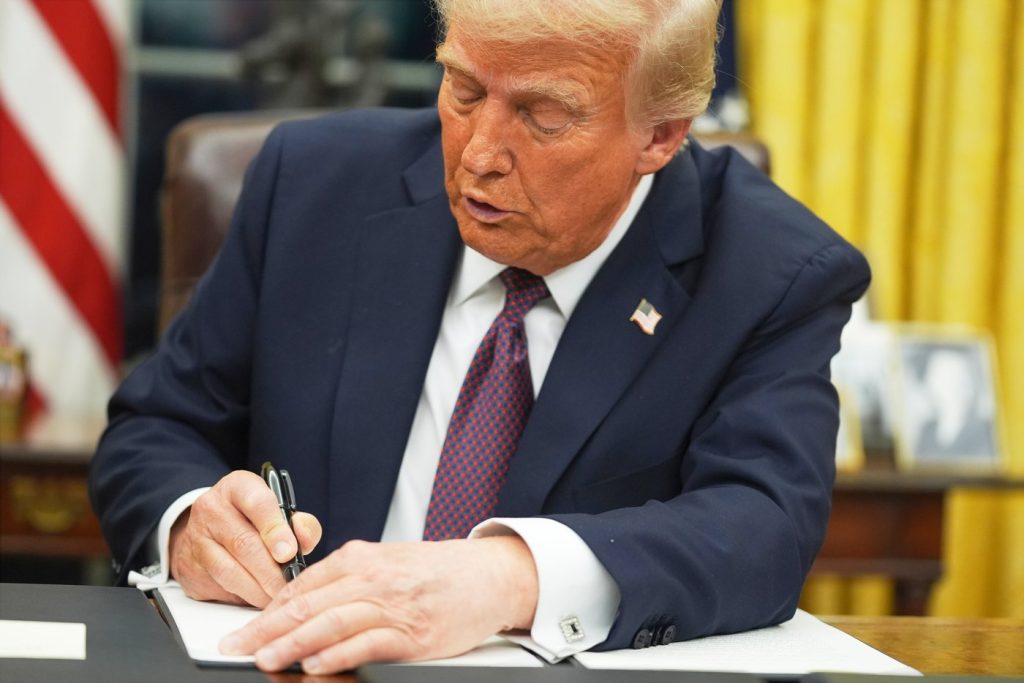Former President Donald Trump initiated a significant legal battle on Friday, filing a lawsuit against media mogul Rupert Murdoch and The Wall Street Journal in federal court in Miami. The lawsuit seeks damages of at least $10 billion, stemming from the newspaper's reporting on Trump’s alleged ties to disgraced financier Jeffrey Epstein. This legal action highlights Trump's ongoing confrontation with major media outlets.
The lawsuit was prompted by an article published by The Wall Street Journal that detailed a sexually suggestive letter allegedly signed by Trump, which was included in a 2003 birthday album for Epstein. In response to the report, Trump vehemently denied having written the letter, labeling the claims as “false, malicious, and defamatory.” This controversy arises amid intensified scrutiny of Trump’s relationship with Epstein, especially as the Justice Department has moved to unseal grand jury transcripts related to Epstein's case, drawing public focus on Epstein's connections with influential figures.
In his announcement, Trump framed the lawsuit as not just a personal grievance but also a stand for all Americans against what he termed as “abusive wrongdoings of the Fake News Media.” A spokesperson for Dow Jones, the publisher of The Wall Street Journal, asserted confidence in the accuracy of their reporting and indicated that they would robustly defend against the lawsuit. Trump's history of litigation against media entities is notable, having previously reached multimillion-dollar settlements with networks like ABC and CBS.
During a recent dinner at the White House, Trump praised Republican lawmakers and emphasized the party's achievements within six months, asserting that keeping promises to voters would strengthen the Republican majority in Congress. He expressed confidence that the upcoming election cycle would favor the GOP if they continued on their current legislative path. The backdrop of Trump's legal actions coincides with his ongoing emphasis on maintaining transparency regarding his administration’s handling of the Epstein case's records.
The letter mentioned in the Wall Street Journal report was reportedly collected by Ghislaine Maxwell, a prominent figure in Epstein's circle, prior to Epstein's first arrest in 2006. The letter's existence has complicated Trump’s narrative about his past associations, particularly as he has referred to some of his supporters as “weaklings” for demanding further inquiries into the Epstein investigation.
As disputes continue regarding the handling of Epstein-related records, the Justice Department's filing to unseal grand jury transcripts has raised questions about what information may emerge. The transcripts could include critical witness testimony and evidence presented during court proceedings, potentially shedding light on the connections of various high-profile individuals to Epstein.
Aside from the lawsuit and the ongoing Epstein narrative, Trump's interactions with the media have taken center stage following the announcement of CBS’s cancellation of “The Late Show with Stephen Colbert,” which had been a venue for Colbert's vocal criticism of Trump. CBS has attributed the cancellation to financial reasons rather than content-related issues; however, the timing has raised eyebrows among political commentators. Trump, celebrating the cancellation, took to social media, expressing joy at Colbert's departure.
Trump’s legal maneuvers coincide with broader political dynamics, including his push for transparency over the Epstein files, amidst increasing pressure from both party bases to clarify the administration's actions during the Epstein controversies. The legal and media strategies employed by Trump continue to solidify his base, while simultaneously safeguarding his public persona against mounting scrutiny.











